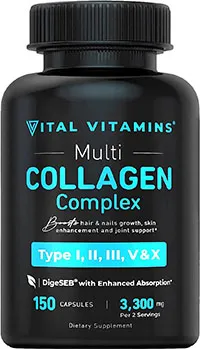Introduction
Collagen, often hailed as the body’s scaffolding, is a crucial protein found in various tissues, including skin, bones, cartilage, and blood vessels. Understanding the different types of collagen and their specific functions is essential for choosing the best type of collagen to address individual health needs effectively.
Type I Collagen: Skin and Bone Health
Type I collagen is the most abundant collagen type in the human body, constituting approximately 90% of the collagen in the skin, tendons, ligaments, and bones. It forms the structural framework of the skin, providing elasticity, firmness, and resilience. Additionally, Type I collagen contributes to bone strength and density, essential for maintaining skeletal integrity and preventing osteoporosis.
Type II Collagen: Joint Support
Type II collagen is predominantly found in cartilage, the flexible connective tissue that cushions and protects the joints. It plays a vital role in maintaining joint health and mobility by providing structural support and promoting cartilage regeneration. Supplementing with Type II collagen has been shown to reduce joint pain and stiffness, improve joint function, and alleviate symptoms of osteoarthritis and rheumatoid arthritis.
Type III Collagen: Blood Vessel and Organ Health
Type III collagen is commonly found in the walls of blood vessels, the intestines, and other organs. It works in tandem with Type I collagen to provide structural support and strength to blood vessels, ensuring proper circulation and vascular integrity. Additionally, Type III collagen contributes to the structural integrity of organs like the liver, spleen, and lungs, promoting overall organ health and function.
Type V Collagen: Cellular Health
Type V collagen is involved in cell adhesion and migration, playing a crucial role in tissue repair, wound healing, and cellular turnover. It interacts with other collagen types to maintain the structural integrity of various tissues and organs, supporting cellular health and tissue regeneration.
Type X Collagen: Cartilage Formation
Type X collagen is primarily found in the growth plates of developing bones and cartilage. It plays a critical role in regulating bone growth and skeletal development, particularly during childhood and adolescence. Type X collagen is essential for the formation of new cartilage tissue and the proper functioning of growth plates, ensuring healthy bone growth and development.
Choosing the Right Collagen Type
When selecting a collagen supplement, it’s essential to consider individual health concerns and goals:
- Skin Rejuvenation: Opt for Type I collagen to improve skin elasticity, firmness, and hydration, reducing the appearance of wrinkles and fine lines.
- Joint Health: Choose Type II collagen for alleviating joint pain, stiffness, and inflammation, promoting joint flexibility and mobility.
- Vascular Support: Consider Type III collagen for enhancing blood vessel strength and circulation, supporting cardiovascular health and organ function.
- Tissue Repair: Supplement with Type V collagen to support tissue repair, wound healing, and cellular regeneration, promoting overall tissue health and vitality.
- Bone Development: Look for Type X collagen to support skeletal development and bone growth, particularly in children and adolescents undergoing growth spurts.
Conclusion
In conclusion, understanding the diverse roles of different types of collagen in the body is crucial for optimizing health and well-being. Whether you’re looking to improve skin appearance, support joint function, enhance vascular health, promote tissue repair, or support skeletal development, there’s a type of collagen that’s best suited to meet your specific needs. By incorporating collagen supplementation into your daily routine, you can nourish your body from the inside out, promoting vitality, resilience, and longevity.
Reference: https://www.ncbi.nlm.nih.gov/pmc/articles/PMC8620403/


